Cracking the Talent Code

Psst! Huddle up.
A little closer.
This is too important to share with everyone. I’ve cracked the talent code. Well, I didn’t crack it myself, but the formula was shared with me. And I’ve seen its success first hand.
I know, this sounds incredible. Anyone who understands the formula can achieve great talent. So why can’t we share this secret with everyone, and then everyone could be awesome? Because if we were all awesome, then we would all be average again.
Kidding, of course.
You’re going to push this far and wide, much like the President advised after they figured out how to bring down the alien spaceships in Independence Day.
Besides, the formula is so mind blowingly simple, that most people who hear it, would not believe it.
Here’s how this will work. You’re going to join the talented elite, and then you will pass the formula on to your students. This is inspired by a simplistic app and long-term study. Here we go . . . .
Start with What You Love
“Find the thing you’re most passionate about, then do it at nights and on the weekends for the rest of your life.” –The Onion
That quote from The Onion is painfully true. Its proof can be found in any of the 10,787 Starbucks at 11pm where every night you can find countless souls who are working feverishly on their screenplays or novels before they’re back up at 6am to head to the job that actually pays their bills.
So in your first pass at the talent code, choose something you’re passionate about. Passion is a key ingredient here. Start with yourself. Master the formula. Then pass on to your students. You can set this up as a class project or after school project. Let them choose something they truly care about. Let them master the formula, and then they can master anything they set out to do.
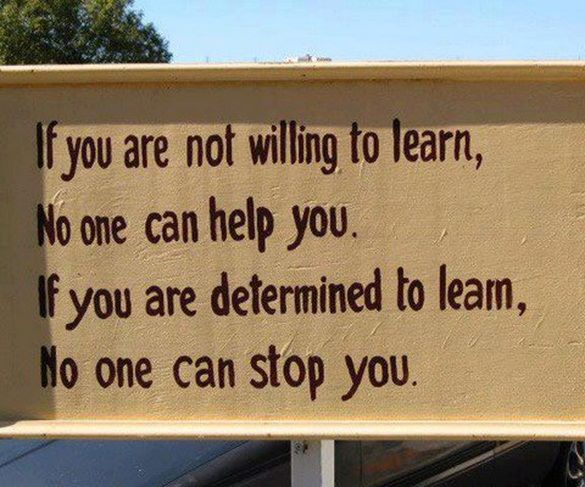
No one can tell you what to pursue in this project. You will have to choose. Follow your heart. This is what you will become. The first ingredient, though, is having a passion that ignites your learning.
Don’t Break the Chain
Now for the big revelation.
A young comedian once asked Jerry Seinfeld how to become a better comedian. Seinfeld said that to become a better comedian, you had to write better jokes. In order to write better jokes, you had to write every day. And that’s what Seinfeld did. He wrote EVERY. SINGLE. DAY. He hung a large yearlong calendar in his home. Each day that he wrote, he placed a big red X on the calendar date. The Xs made a chain: XXXXXXXX . . . and once the chain got long enough, he didn’t want to break it.
Don’t Break the Chain has been a web-based app for sometime, and its popularity is growing. You can now get the app for your smartphone and tablets.
It’s incredibly simple. It’s a calendar that you place an X on.
Don’t Break the Chain is a powerful motivator, too, that works on several levels. The brilliance of this is that it provides two profound motivators that reinforce and support each other. First, you WANT to become good at what you love. That’s natural. Second, once you have a chain going, you want to protect it. It becomes this “visual thing” that you want to nourish. You will want it to keep growing. This is now twice the motivation. You’re doing the thing you love AND you’re protecting the chain, and the chain represents the body of work, the effort, the time and commitment. And that’s amazing. Recognizing, appreciating, and cherishing THE EFFORT will be crystallized for the first time with many people as they protect their chain.
Another important process will unfold as you guard the chain. You will send constant signals to your brain that this is important. You loved the activity before, but now you love it and you realize how important it is to you. In short order, the activity you are practicing each day will become part of your identity. The chain will change you. You will pack differently for vacation to include the activity. You will plan your day differently. You will start having internal monologues about the chain. You and the activity will become synonymous. If you write for 112 straight days, you are indeed a writer. Published or unpublished (what does that mean today), that won’t matter.
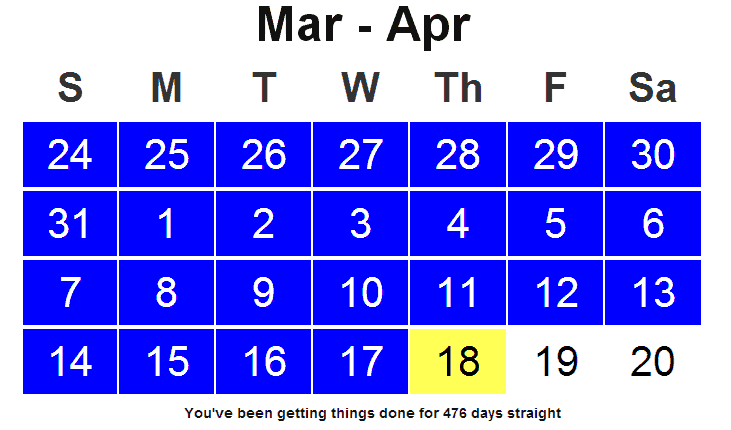
Great writers from Hemingway to Joyce have given this advice for a long time: Write every day. Ignacy Paderewski, a Polish pianist, said this:
If I miss one day of practice, I notice it. If I miss two days, the critics notice it. If I miss three days, the audience notices it.
You might be thinking, isn’t every day a bit much? Is that even healthy?
You will need to make that personal decision. But dispel the notion that it’s unhealthy, unless the activity you choose is unhealthy. You brush your teeth every day, right? If you perform the full-blown floss-gargle-brush-examination routine, you’ve probably spent the same amount of time as you would on your activity.
Indeed, for hundreds of thousands of years, humans had to hunt and forage for food to survive. They did that EVERYDAY. We are capable of extraordinary efforts when are minds are in the right place. This is what the talented elite do.
As you maintain your chain, you will have some days that are just “maintenance” that keep the chain going . . . a 15 minute run, a review of what you wrote yesterday, a 10-minute guitar practice. Maintenance is okay. It’s telling your brain that this is important.
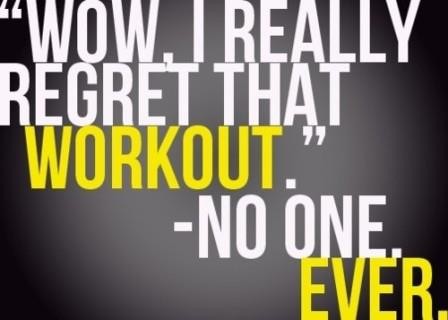
Your chain will eventually be broken. Life will happen. Guaranteed. Take this pledge: I understand that the chain will eventually be broken, but I won’t break the chain because I chose to break it.
This means that when you’re laying in bed at 11:30 and you remember that you didn’t play the violin, you will roll out of bed and play. You might just play for maintenance, but you’ll play. You’ll have a longer, deeper practice the next day. And when you decide to roll out of bed at 11:55 . . . at that moment . . . you will truly realize that you are without question a violinist.
Or a writer.
Or coder.
Drummer.
Guitarist.
Cartoonist.
Martial artist.
Mathematician.
You will know it then. You will think differently. You will act differently. You will carry yourself differently. Others will notice.
My Case Studies
My daughter had a great guitar practice the other day. Her instructor couldn’t get over how much she had improved in the last few weeks. When the instructor and the studio owner found out that she had practiced for 55 straight days, they literally cheered! The entire place clapped and congratulated her. She swelled with pride and walked out two feet off the floor. After 14 months of regular practice, 3 recitals, and 55 straight days of practice, which included lugging that guitar around on spring break, she had no doubt that she was a musician. It was the chain of 55 days in a row, though, that truly elevated her performance.
My chain story goes back to my sophomore year in high school. I was a decent track runner on a team that was filled with great runners. At times I showed flashes of promise, but I usually ended up at the back of the lead pack.
One day, two graduates came back to speak to the team. One was our school’s mile record holder (4:23) and the other was our school’s two mile record holder (9:14). Both were then running for Western Kentucky, which was a powerhouse cross country and track team. This was a thrill, having these two school legends give us advice. The mile record holder made the point that track was a very easy sport to get better at. You just had to run every day. Every day that you ran and your competition didn’t, you were one day better than they were. In fact, hope for bad weather. Hope for days that your competition won’t train. Be certain to train on those days. But in essence, train every day.
And the light bulb went off.
That made sense. It was so simple, but it was brilliant. Who couldn’t follow that formula to success?
I’m just going to run every day.
I missed days all the time back then, but I knew I was capable of running each day. And that’s what I did. I ran every day for 26 straight months. That’s a very long unbroken chain. The result? I graduated high school with the city mile record (4:15) and the city two-mile record (9:05), a state two-mile championship, and a scholarship to Indiana University, which had one of the best track programs in the nation and was coached by the two-time Olympic coach, Sam Bell. By not breaking the chain, my high school running dreams came true, I went to a great school, met my future wife, and learned invaluable lessons that carry me through today.
Brad Isaac from Lifehacker writes:
It works because it isn’t the one-shot pushes that get us where we want to go, it is the consistent daily action that builds extraordinary outcomes. You may have heard “inch by inch anything’s a cinch.” Inch by inch does work if you can move an inch every day.
Daily action builds habits. It gives you practice and will make you an expert in a short time. If you don’t break the chain, you’ll start to spot opportunities you otherwise wouldn’t. Small improvements accumulate into large improvements rapidly because daily action provides “compounding interest.”
Skipping one day makes it easier to skip the next.
It’s that daily action that makes the average person appear like a genius or naturally gifted. See Thomas Edison or the Wright brothers. Both pursued their dreams with a relentless daily routine.
Daniel Coyle writes in his book The Talent Code: Greatness Isn’t Born. It’s Grown. Here’s How. that daily practice is what makes us talented. We’re not born talented. It’s earned. He explores the idea of “deep practice.” We need to go just beyond our comfort zones when we practice. We must go to where our skills run out and our goals are tantalizingly close, but not yet in our grasp. Welcome those mistakes and failures that accompany this territory. They are mandatory in the process. (See Edison’s light bulb and the Wright Brothers’ flying machine.)
This is where the real learning takes place. Examine those failures. Take mental notes on what went wrong and how to correct. It’s this type of metacognitive deep learning that builds the myelin that insulates our neural pathways. It’s the stuff that talent is made of. Pure. &. Simple.
Coyles relates that when you combine deep practice with daily practice, the rules of the world are suspended. Learning takes place at a rapid rate. Weeks of regular practice can be gained in just a few hours.
You will have maintenance days. (Important.) You will have deep practice days. (Important).
The Mentor
Coyle notes that the role of the mentor is essential in cracking the talent code. As educators, we need to help our students with the idea of deep practice. School has not been a place where we’ve welcomed mistakes. For this project, it’s required. Encourage as much metacognitive thinking with students as possible as they practice their passions. Metacognition is not a skill that we typically foster in our classroom, not when the pace and end game are driven by testing.
Your job is to slow them down to the pace of thoughtful, deep practice. Find the “sweet spot” where their skills run out. That’s where they need to be. Not so far out that it seems impossible, but just out of reach right at that point where IT’S EXCRUCIATINGLY POSSIBLE.
In your project, celebrate the milestones on Don’t Break the Chain. Skills and performances are usually celebrated, but we are going to celebrate the perseverance and dedication of the chain. Make Day 30 and Day 100 big celebrations. Celebrating chain milestones will be exciting for students as they arrive at those landmarks on different days.
My son recently passed Day 100 on bo staff training. He went from a novice who thought every move was impossible to . . . some sort of ninja warrior in less than 100 days. We saw the big breakthrough on Day 52. That’s when everything gelled, when all movements became extensions of other movements. The bo staff started to hug every contour of his body as he spun and tossed it.
The Talent Code Formula
Let’s review . . . .
Passion + Don’t Break the Chain [Practice & Deep Practice & Maintenance] + Mentor = Talent Code
FINAL STEPS
The goal of a school-based talent code project is for students to understand how talent is developed. They should start with something they are passionate about. Let them see first hand how their skills increase. Once they understand how the talent code works and once they start to believe in it, then they can apply the talent code to ANYTHING that they want to achieve in. Today it might be Taekwondo. Tomorrow, algebra.
Now go earn that first X.



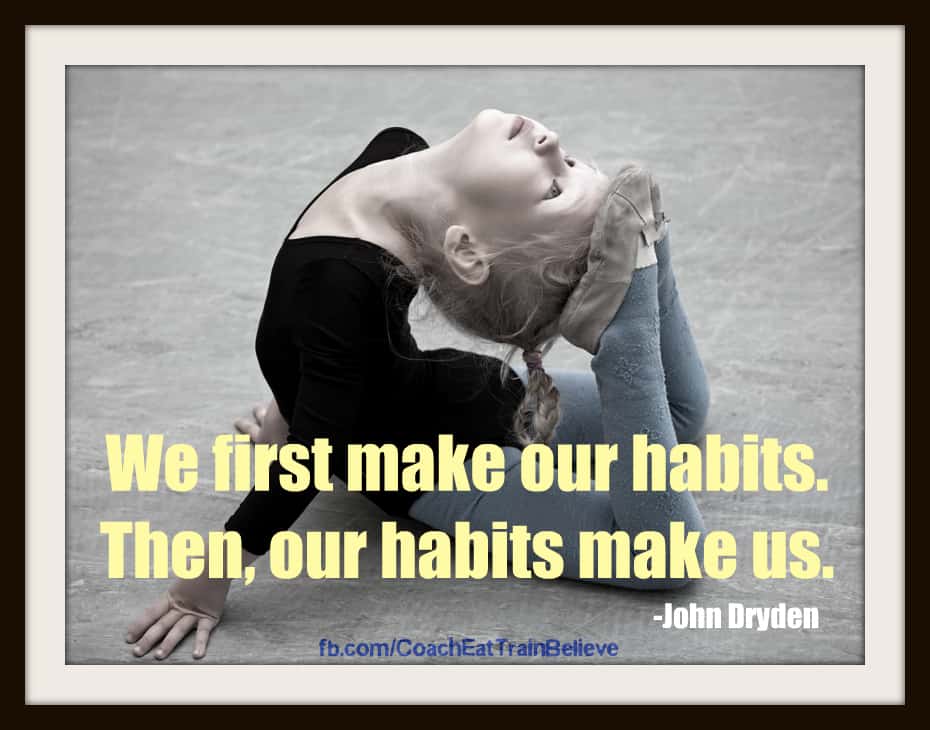
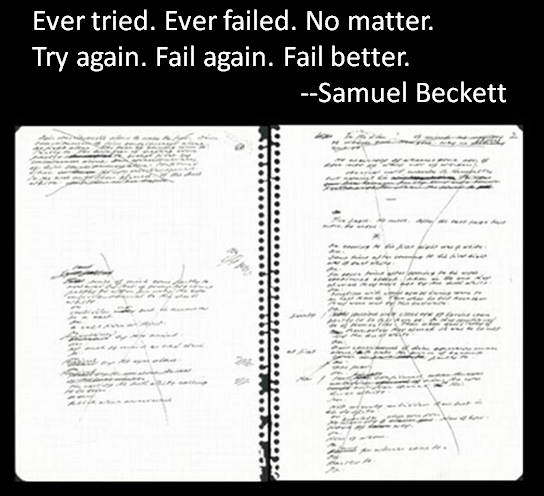



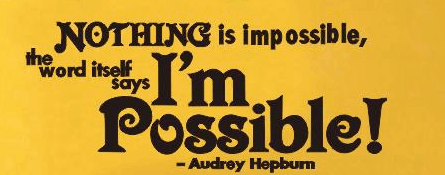



0 Comments
Leave a Comment
Your email address will not be published. All fields are required.